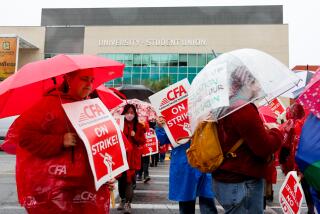BART strike enters Day 2, promising more commuting chaos
The Bay Area Rapid Transit system is out of service again Tuesday as workers begin their second day of a strike over pay and other issues.
Talks between BART management and two unions broke down Sunday night, causing the 104-mile system to grind to a halt and leaving 400,000 weekday riders scrambling for transportation.
Despite more buses, ferries and casual carpoolers, traffic reports still described the San Francisco-Oakland Bay Bridge as “worse than a parking lot” during Monday’s morning commute.
Since then, little seems to have changed in the labor dispute.
“I wish I had news for you, but BART hasn’t offered any new proposals to bring about a resolution, and we’re on the second day of our strike,” said Cecille Isidro, a spokeswoman with Service Employees International Union Local 1021 – one of the two unions striking. “They have not come back with any proposals that address critical safety issues and fair pay.”
In a statement issued Monday night, BART officials urged commuters to make alternative travel plans for Tuesday.
“We are sorry that the actions of ATU and SEIU have caused such a tremendous disruption to the people of the Bay Area,” the BART statement said. “We are working hard to bring a fair and responsible resolution to labor talks.”
On Monday, commuters found inventive ways to get to work. Wayne Phillips did everything but swim as he struggled to get to his tech job in this city’s Financial District.
His usual smooth ride on a Bay Area Rapid Transit train was derailed by the system’s first strike in 16 years. So Phillips drove from the East Bay city of Concord to Oakland. He stood in a “quarter-mile-long” line for a ferry. Then he gave up and jumped on his own boat, a 30-foot Bayliner named Lovin’ Life.
“I boated to South Beach Harbor and then took Muni,” Phillips said, referring to the local bus, trolley and cable car system. “It was the first time I’ve done that. ... I was waiting in that line, and I realized I would have gotten here at 11 a.m.”
To Fernando Leal, who does electronics work for the San Francisco Municipal Transportation Agency, the strike was an eye-opener about how badly coordinated the region’s transit system is. The 61-year-old usually takes BART from Oakland to San Francisco, but on Monday he was searching for a bus.
“I can’t get a bus at the [Rockridge] BART station,” he said, speaking as a frustrated commuter who had to get up an hour earlier and pay a dollar more. “I have to get a bus somewhere else and find a place to park my car … and then walk to Muni. We’re very dependent on BART.”
At a news conference Monday afternoon, Gov. Jerry Brown declined to elaborate on a brief written statement by his spokesman the night before as talks between BART management and SEIU Local 1021 and Amalgamated Transit Union Local 1555 broke down.
“BART and its labor unions owe the public a swift resolution of their differences,” spokesman Evan Westrup had said. “All parties should be at the table doing their best to find common ground.”
But areas of agreement were in short supply as union members and management blamed each other for the strike, the difficulties endured by Bay Area commuters and lack of a timetable for negotiations to resume.
The biggest sticking point is money. The unions initially had asked for a 5% raise per year for three years, with inflation protection. BART’s most recent counteroffer, proposed Saturday, was for 2% in raises each year over the four years of the contract.
“We are sorry people’s lives have been disrupted by the union strike,” BART spokesman Rick Rice said. “This strike is not necessary, and we call on union leaders to end it and join us at the table so the Bay Area can get moving again.”
Antonette Bryant, president of ATU 1555, which represents train operators and station agents, said: “Our members aren’t interested in disrupting the Bay Area, but management has put us in a position where we have no choice.”
ALSO:
Stanford alum makes record donation of $151 million
Same-sex marriage a business boon for wedding planners
San Diego judge: Yoga case ‘almost like a trial by Wikipedia’
matt.stevens@latimes.com
maria.laganga@latimes.com
leora.romney@latimes.com
More to Read
Sign up for Essential California
The most important California stories and recommendations in your inbox every morning.
You may occasionally receive promotional content from the Los Angeles Times.













